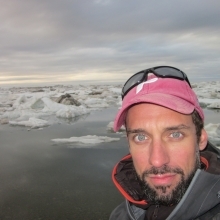
Dr. Phil Bucolo is an academic educator and community ecologist that joined the Department of Biological Sciences in 2015. As an instructor, Dr. Bucolo utilizes many active learning techniques rooted in the use of the scientific process to teach biological concepts. He clearly states learning objectives, promotes open discussions and debate, and provides a cooperative classroom environment conducive for comprehensive understanding and retention of material. Dr. Bucolo’s enthusiasm, energy, expertise, and personal research experiences throughout a number of exotic marine habitats inspires a classroom culture that is both fascinating and challenging for his students. His research endeavors focus on algal ecophysiology and the biochemical and ecological drivers of lower trophic level communities in aquatic systems. Specifically, he examines primary and secondary production, predator-prey relationships, biofouling, community shifts caused by human activities, and the chemical ecology of marine communities. Dr. Bucolo’s research experiences have included investigations throughout Louisiana’s wetlands, coastal Gulf of Mexico from south Texas to the tropics, and subtidal systems along the Antarctic Peninsula and the Alaskan Arctic. Dr. Bucolo is always seeking new research endeavors and promoting undergraduate research interests so stop by his office for an ecological chat.
Degrees:
B.S. Loyola University New Orleans 2003
M.S. Mississippi State University 2006
Ph.D. University of Alabama Birmingham 2011
Classes Taught:
Investigating Nature
Biology of Organisms Lab
Life in the Life Sciences-First Year Seminar
Human Ecology
Aquatic Microbiology Lab
Areas of Expertise:
algal ecophysiology, chemical & community ecology, photophysiology, natural history of algae
Collaborative Research with Students:
Dr. Bucolo is very interested in collaborative research with Loyola students and mentoring independent research projects. His current research interests include cataloging the algal flora of City Park wetlands, investigating phototactic behaviors of algae in the Lake Pontchartrain Basin, nutrient limitations of a new algal growth media, primary production of sediment microalgae, the effects of eutrophication on local wetlands, and effects of mangrove intrusion into marsh habitats and their associated epiphytic microenvironments.
Selected Publications:
Bucolo P, Sullivan MJ & Zimba PV. 2008. Effects of nutrient enrichment on primary production and biomass of sediment microalgae in a subtropical seagrass bed. Journal of Phycology. 44:874-881.
Bucolo P, Amsler CD, McClintock JB & Baker BJ. 2011. Palatability of the Antarctic rhodophyte Palmaria decipiens (Reinsch) RW Ricker and its endo/epiphyte Elachista antarctica Skottsberg to sympatric amphipods. Journal of Experimental Marine Biology and Ecology. 396: 202-206.
Bucolo P, Amsler CD, McClintock JB & Baker BJ. 2012. Effects of macroalgal extracts on spore behavior of the Antarctic epiphyte Elachista antarctica. Journal of Phycology. 48(6): 1403-1410.
Bucolo P, Amsler CD, McClintock JB & Baker BJ. 2012. Phototactic responses of Elachista antarctica (Phaeophyceae) spores of different ages across a broad irradiance range using new motion analysis software. Botanica Marina. 55(6): 639-642.
McTigue ND, Bucolo P, Liu Z & Dunton KH. 2015. Pelagic-benthic coupling, food webs, and organic matter degradation in the Chukchi Sea: Insights from sedimentary pigments and stable carbon isotopes. Limnology and Oceanography. 60: 429-445.
